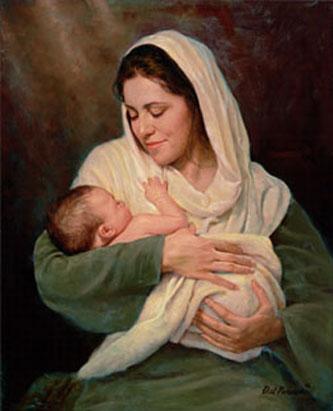
Mother’s_day_udit1 from Wikimedia Commons
Mother’s Day makes me think about God’s maternal side. Christianity has been guilty of a patriarchal history that has been oppressive of women. Our conception of God as masculine, e.g. God as Father or King, certainly contributes to our slide into patriarchy. Although written in patriarchal contexts, the Bible itself does not refer to God exclusively in masculine metaphors. There are, albeit few, feminine metaphors used to describe God in the Bible. In this post, I want to highlight the maternal or motherly metaphors used.
God as Mother Bird & Mother Bear
One of the common images is God as a mother bird sheltering her children under her wings. We see this in Ruth 2:12 – “May you be richly rewarded by the LORD, the God of Israel, under whose wings you have come to take refuge.” (All references are from Today’s New International Version.) The Psalms used this imagery a number of times:
“Keep me as the apple of your eye; hide me in the shadow of your wings.” (Psa. 17:8)
“… I will take refuge in the shadow of your wings until the disaster has passed.” (Psa. 57:1)
“He will cover you with his feathers, and under his wings you will find refuge …” (Psa. 91:4)
Jesus picks up these images when he laments over Jerusalem:
“Jerusalem, Jerusalem, you who kill the prophets and stone those sent to you, how often I have longed to gather your children together, as a hen gathers her chicks under her wings, and you were not willing.” (Matthew 23:37; Luke 13:34)
These images paint God as a protecting and sheltering God for his people. But a variation of this image paints a God who also pushes his children to be independent and to grow stronger. Mother eagles are known to teach their young ones to fly by deliberately pushing them out of its nest but catching them before they plunge to their doom: “[God] guarded [Jacob] as the apple of his eye, like an eagle that stirs up its nest and hovers over its young, that spreads its wings to catch them and carries them aloft.” (Deuteronomy 32:10-11)
Before we claim that the Bible only reinforces stereotypes of motherly warmth and care with these images of God, check out Hosea 13:8 – “Like a bear robbed of her cubs, I will attack them and rip them open,” says the Lord. Here, we see that the maternal instinct to protect the children can produce wrath as much as warmth. Beware the fury of a mother! No sentimental mother-image here.
God as Human Mother
Of all the prophets, Isaiah seems to be the fondest in painting God as an actual human mother as these three verses attest:
“For a long time I [God] have kept silent, I have been quiet and held myself back. But now, like a woman in childbirth, I cry out, I gasp and pant.” (Isa. 42:14)
“As a mother comforts her child, so will I [God] comfort you; and you will be comforted over Jerusalem.” (Isa. 66:13)
“Can a mother forget the baby at her breast and have no compassion on the child she has borne? Though she may forget, I [God] will not forget you!” (Isa. 49:15)
That last verse is one of my favourite verses for use in the assurance of forgiveness in a worship service. I like it for its compassionate and faithful portrayal of God but also because it is one of the few feminine images of God that I can use in a service. It reminds the congregation that God is beyond gender; the gender pronouns are simply metaphors to help us understand God who is always beyond our full understanding. As theologian Lynn Japinga wrote, “Language about God should help us to understand and encounter God, but we should not confuse the reality of God with the limits of our language.” (Feminism and Christianity: An Essential Guide, Abingdon: 1999, p. 64)
I know there are many conservative Christians who are uneasy with using feminine images for God. But using female metaphors for God is not a radical feminist innovation as the biblical passages above show. It is also part of early Christian history. Here, I refer again to Japinga:
In the second century, Clement of Alexandria mixed his metaphors in his description of Christians nursing at the breast of God the Father. Medieval mystic Meister Eckhart described God’s activity: “What does God do all day long? God gives birth. From all eternity God lies on a maternity bed giving birth.” (Feminism and Christianity, p. 65)
But Never Called Mother God
It is true, however, that despite these maternal images, the Bible never used the feminine gender for God, and never called God “mother”. In an ancient patriarchal culture, it is not surprising that the ancient Hebrews used masculine pronouns for God. But I don’t think that was to suggest that God has a masculine gender.
According to the Hebrew scholar Samuel Terrien, the reason why the ancient Hebrews never called God “Mother” was that “they reacted against the allurement of the Mother Goddess cult because they somehow sensed the difference between true divinity and deified nature.” (Till The Heart Sings: A Biblical Theology of Manhood and Womanhood, Eerdmans, 1985, p. 60) According to Terrien, ancient mother goddess worship, unlike certain modern-day revivals, was never about empowering or glorifying women. It was about glorifying Nature, with a capital N. It was born not from a veneration of female humanity but rather born from a confusion of the divine with nature; in essence, Mother Earth was worshiped as Mother Goddess. Thus, all that are primary issues with nature, i.e. fertility, sexuality, life, health and death, were associated with the ancient Mother Goddess cults. These religions tend to merge sex with religious ecstasy and economic security (agriculture and husbandry). It is not surprising, then, that many of their religious rituals involved sexuality, even temple prostitutes.
Hence, the Old Testament’s refusal to call God “mother” was not a misogynist act. It was an attempt to emphasize God’s transcendence over nature and to steer away from the ancient goddess religions that over-emphasized divine immanence in nature. Neither was calling God “father” a glorification of human fathers or males but rather, the Old Testament consistently merged the images and metaphors of the fatherly God with motherly compassion and love, as the maternal images above suggest.
Something True About God
Mother’s Day is as appropriate as any occasion to recapture the biblical maternal images for God to help us see further truths about God. “People described God in feminine terms, not because God is actually a woman, but because feminine or maternal traits say something true about God and about their experience with God.” (Japinga, Feminism and Christianity, p. 66). The same must be said of masculine and paternal images for God. We must not confuse these metaphors with God’s reality.
- What do you think of God as a mother?
- Have you heard it used in a worship service?
- How did you feel or react?
Do you feel uneasy about such images or terminologies?

Shiao Chong is the Christian Reformed Campus Minister serving at York University in Toronto Canada as the Director of a student Christian club on campus. He attends Rehoboth Fellowship Christian Reformed Church in Toronto. He is married to Martha with three daughters. Chong has written articles for various Christian publications and blogs. His blogs at 3dchristianity.wordpress.com where this article first appeared.
This post is part of a series posted for Mother’s day that focuses on the mothering aspects of God. Here are the rest of the posts: Enjoy
Meditation Monday – Connecting to the Mother heart of God
Maternal Images of God – a video and a prayer
Let’s Get Creative – Honouring Our Mothers
Anselm’s Prayer to St Paul: Our Greatest Mother

14 comments
[…] Biblical Maternal Images of God by Shiao Chong […]
Thanks Christine, I appreciate it. The closest I have come to is ‘Prayer of the Cosmos’ by Neil Douglas-Klotz which is his interpretation of the ‘Lord’s Prayer’ translated straight from the Aramaic with some interesting results!
Thank you for your article. It is an area I am growing in. Do you have any resources you would recommend, or thoughts around why Jesus in particular used Father? As he spoke in Aramaic, did it translate directly to Father?
Thanks Jane for your comment. I honestly do not know the answer to your question about the use of Father. Sometimes the language is gender neutral and was translated male. Sometimes it was indeed male. But there are also times that the language is female and still translated male. I will put together a reading list and try to post it next week.
Hi Jane, I don’t know about the translations of Aramaic, but the one Aramaic word for father that was kept untranslated in the Scriptures that Jesus used is “Abba” which is an Aramaic term of endearment akin to “Daddy”. Jesus used this in Mark 14:36. This was not a term that Jews would use for God as it is deemed too common or too familiar and hence, possibly too disrespectful.
And Paul develops this in Romans 8:14-17 and Galatians 4:6-7 to emphasize that we are children of God. Hence, as far as Paul is concerned, Jesus’ use of “father” for God, at least of “abba, father” was not something for us to ponder about God’s masculinity or gender role but more about our relationship as children to God.
I got these references from Samuel Terrien’s book, Till the Heart Sings (p. 139).
For what it’s worth.
I have read that the Holy Spirit is sometimes referred to with a feminine pronoun in the New Testament. I don’t know if this is true and have not done the language work necessary to find out – but it’s become my practice to do so myself. This idea of the Spirit as feminine is bolstered by the Old Testament writings about Wisdom, which is often (always?) referred to in the feminine form and is, in my mind at least, an antecedent of the Comforter Jesus left us.
Hey there! I’ve heard in the Greek NT that the Holy Spirit is addressed with neuter pronouns. In the OT, however, the word ruach (which is apart of the name of the Holy Spirit in Hebrew, Ruach HaKodesh) is gramatically feminine in that case. And yep, even early Christians (like in Eusebius’ Church History) said that Jesus was the Word and Wisdom of God; Jesus was the fufillment of Lady Wisdom from Proverbs!
Thank you for this – I have read the same but have not been able today to find the reference – obviously more research and posts to come about this.
I did come across another article that I have found very helpful that you might like to look at http://www.empowerinternational.org/empower_bu/Articles/Godasmother.pdf
[…] thought from Biblical maternal images of God by Shiao Chong: It is true that despite biblical maternal images of God, the Bible never used the feminine gender […]
I think the word feminine probably refers to the fact that the Holy Spirit’s reproduction attributes; as of a person must be born again. Born of water and spirit.Water is the spirit. The Father draws us in and the spirit produces or reproduces us as born again. Titus 3.5 Not by works of righteousness which we have done, but according to his mercy he saved us, by the washing of regeneration, and renewing of the Holy Ghost;
Thanks Bobby for these thoughts. I have never really thought about the reproductive aspects of the spirit, but you are right. We talk about the spirit spreading throughout the world, being birthed in new communities and new ways yet never really associate it with the birth process.
[…] Biblical Maternal Images of God by Shiao Chong […]
[…] Biblical Maternal Images of God by Shiao Chong […]